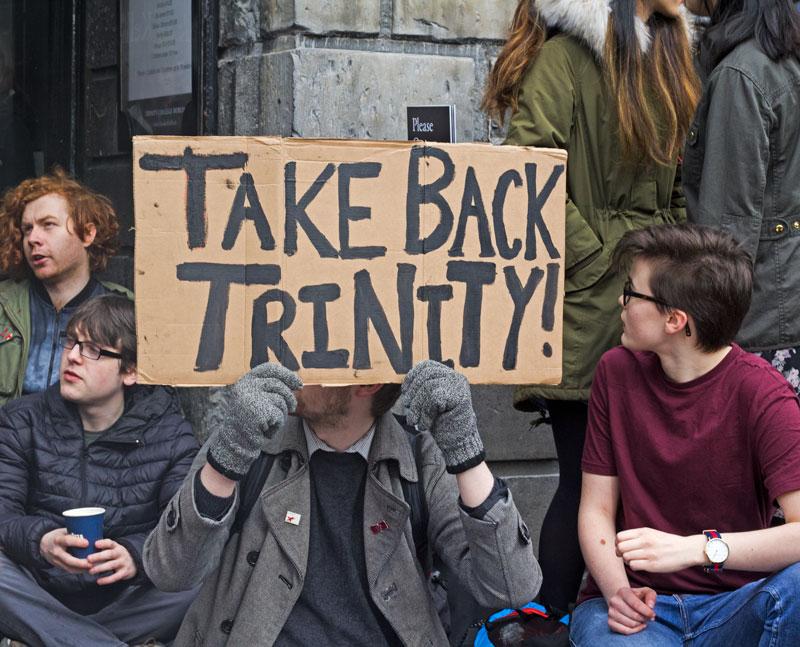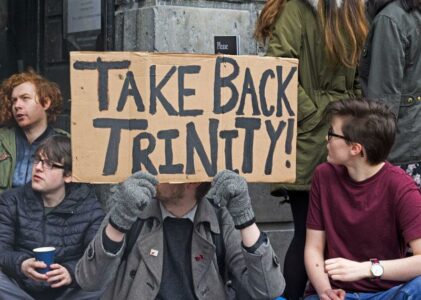László Molnárfi
College’s dorm guests policy amounts to a de facto total ban on overnight visitors. This is the institution’s declaration of war on sexual activity. There is no surprise that the ordeal concerns sex, echoing the in loco parentis attitudes of university management in the 1960s, when they sought to establish themselves as parental authorities over students through the use of bureaucracy. Thus, the policy is an expression of the neurosis of bureaucracy, and its contorsions to regulate the human spirit. Within it, shards of despotic signifiers are interpellated. It is the penchant of the priest for sexual suppression, the desire of the patriarch to extract submission and the tunnel-visioned obsession of the police-officer to regulate behaviour. In this way, College’s policy takes place in a social context that stretches from the sixties until the present day, a remnant kernel of an authoritarian attitude towards students.
As Wilhelm Reich recognized in his 1933 work The Mass Psychology of Fascism, sexual suppression is the gateway to social conditioning. “The goal of sexual suppression is that of producing an individual who is adjusted to the authoritarian order and who will submit to it in spite of all misery and degradation,” he wrote. This is why in history hitherto sexual control has been promulgated by the authorities, at first the church-state and then the secular state, starting in childhood through the transmission of dominant cultural patterns from caregivers. Thus, it begins in the nuclear family when the patriarch stands in as the representative of social authority. The authorities want us to make love within institutional frameworks, and not outside of them. Otherwise, their entire project of repression is threatened. In other words, if sexual desire can be bent, so can political desire, and this is the task of the bureaucratic-administrative apparatus that permeates society. Impotence is the soul of capitalism, the removal of decision-making power over our affairs, whether that be the managerial elite of the university, the company boss or the state minister. To demand the end of alienation from the institutions that govern us is the essence of our fightback, which is a restoration of potence to the human spirit through self-agency, the development of a liberated subject.
Thus, the fight against the overnight guests policy is an act of resistance to an interconnected system of oppression. The bureaucratic-administrative apparatus has no start and no end. The power of the university is inherently tied to that of the State, and its henchmen, the Gardaí, and ultimately to that of Capital itself. Should it be the case that we students refuse the overnight guests policy, and take matters into our own hands, by forcing ourselves in at security, we will be prosecuted. In its parabolic conclusion, should we remain steadfast in disregarding this unjust policy, we will be evicted by the College, backed up by the physical force of the Gardaí. In this lies an important truth, insofar as all instances of oppression are interconnected, not isolated.
The authoritarian motif is central to systemic oppression, in that it reappears here and there, permeating institutions and their panopticons. The infantilizing attitude of the Junior Dean’s office towards students’ sexual activities mirrors that of the erstwhile church and its priests inducing shame about sex; of the family’s attempt at discouraging their adolescent’s sexual exploration; of conservatives in their attempts to subjugate women to the patriarchy. Joining the war on young people, it is the Gardaí batoning students for socializing on South William Street a few years earlier. It finds itself within thousands of landlords across Ireland enforcing similar policies. It parallels the way the Students’ Union’s constitution strips us of the ability to take political stances, depriving us of control over our own destiny. It echoes in the secondary schools that prioritize teaching obedience within the ‘hidden curriculum’ over critical thinking. It resurfaces with drug policies dictating what we can and cannot put into our own bodies—and more. Desire of any kind, whether it be sexual or otherwise, is always dangerous, as it is “always escaping, seeping out, threatening the social order” as Janae Sholtz writes in Desire, Delirium, and Revolutionary Love: Deleuzian Feminist Possibilities from 2022. So, it must be tamed in all areas of life.
Hence the fascination of the authorities with systems of control; the drive to foreclose possibilities mirrors the ruling-class’ fear of a revolutionary contingency in world-history. By recognizing this common thread across diverse forms of oppression, we equip ourselves for a fightback grounded in the principle of solidarity. We, students, are thus innately involved in a “political struggle against all machines of the dominant power, whether it be the power of the bourgeois State, the power of any kind of bureaucracy, the power of academia, familial power, phallocratic power in male/female relationships, or even the repressive power of the superego over the individual” as Félix Guattari says in Everybody Wants to be a Fascist, written in 1995. Having noticed an instance of oppression on campus in the form of the overnight guests policy, we have set upon destroying it, bringing us all one step closer to liberation.




